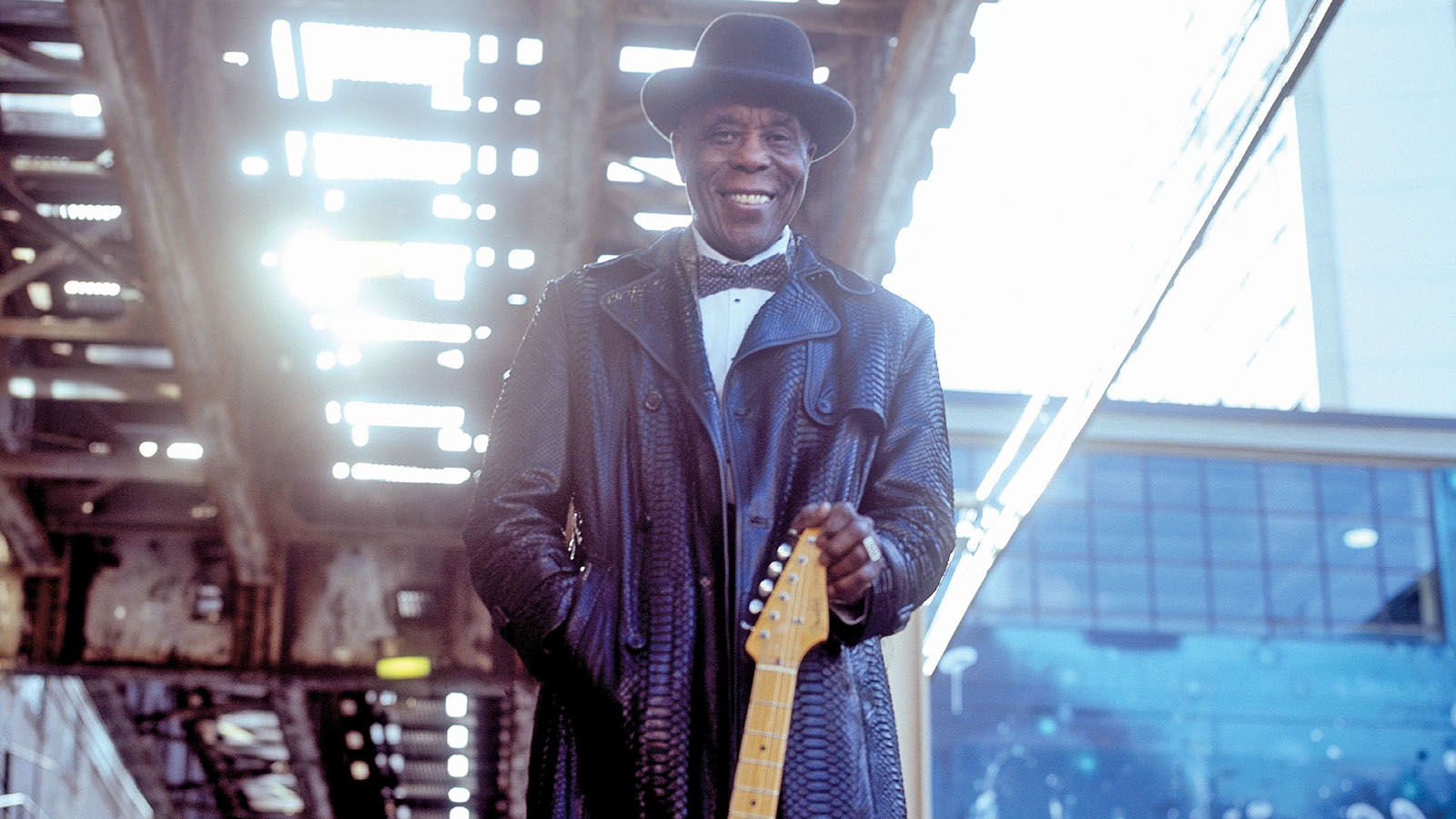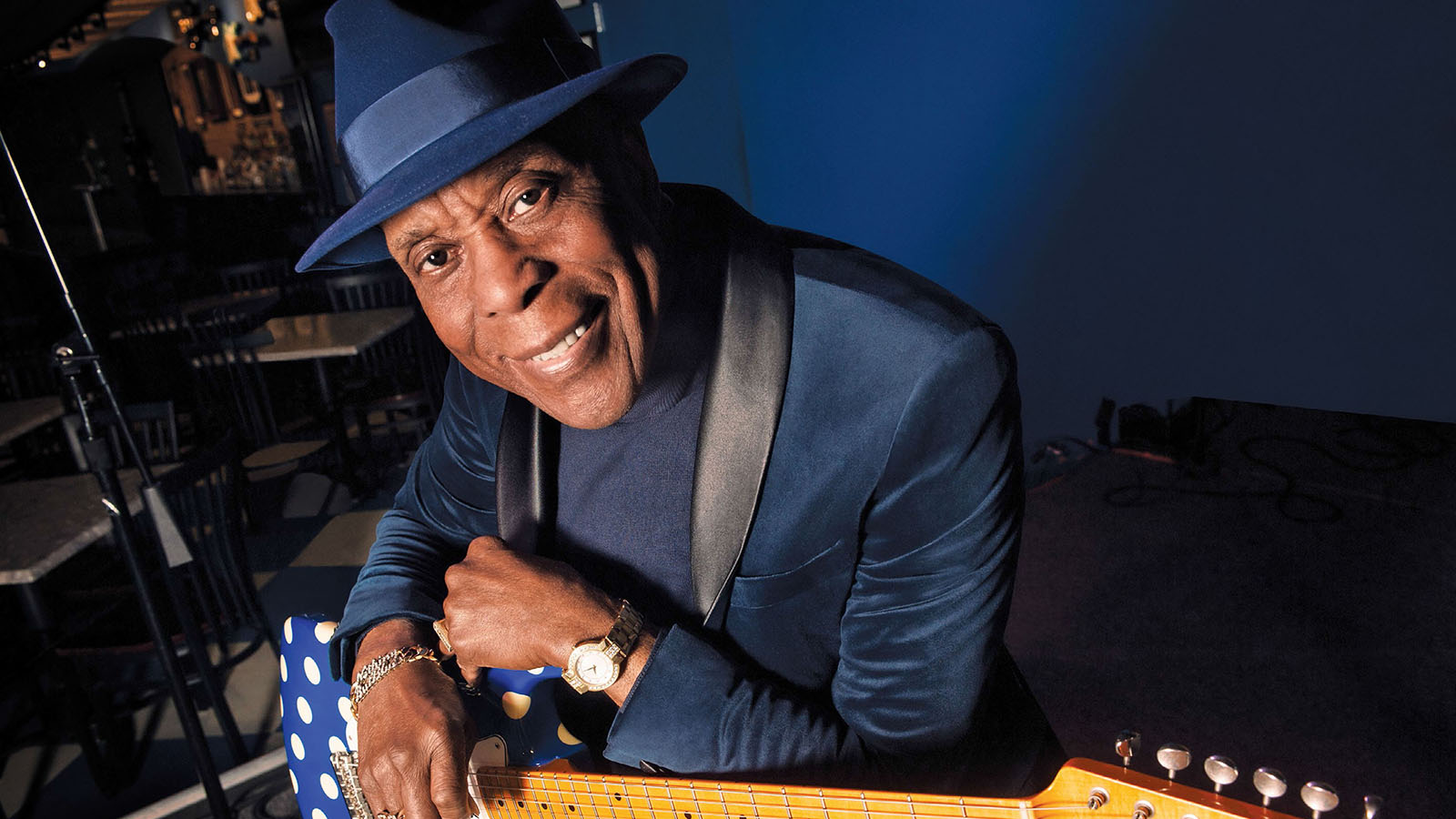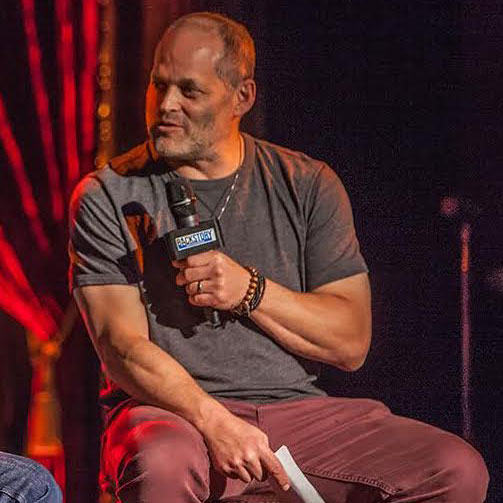
Buddy Guy is, In many ways, the last man standing: a link to the titanic Chicago bluesmen of the Fifties and Sixties who electrified the music and in the process birthed rock and roll. At 82, Guy is still a bundle of caged, coiled energy, emitting a feeling of tension, like a cobra ready to strike at any moment. He’s a master of dynamics who brings songs up and down, punctuating low-volume, cleanly articulated Strat runs with bursts of overdriven clusters of notes and flurries of fury. His voice is just as powerful an instrument, displaying all the same subtleties and strength. His performances have you leaning forward in your chair to catch every note before blowing you onto your heels with a burst of muscular energy.
You can hear all of it on Guy’s new album, The Blues Is Alive and Well, which features guest appearances by Jeff Beck, Keith Richards and Mick Jagger. “The love these guys have for him is readily apparent,” says Tom Hambridge, who produced, played drums and wrote or co-wrote 13 of the 15 songs on the album. “They all basically say they will drop anything they are doing to work with Buddy. It’s not fake.”
These blues-based rock stars and their peers spent decades singing Guy’s praises while the bluesman was scuffling without an American record deal — despite having been a prime influence on Beck, Richards, Eric Clapton, Jimi Hendrix and many others, as well as a direct link to Muddy Waters, Son House, Sonny Boy Williamson and other musical giants, all of whom he recorded with.
Guy finally got his shot again in 1991 with Damn Right, I’ve Got the Blues, and he hasn’t looked back, assuming his rightful place as a guitar legend while touring and recording consistently and running his Chicago club, Buddy Guy’s Legends.
“Buddy’s the hardest-working guy,” says Hambridge, who has produced Guy’s last five albums. “He’ll always stay in the studio until we’ve got it nailed. He always plays a song all the way through, but he’s open to everything around him. Everything’s on the table, which is amazing for a guy his age — and he seems to be getting more and more open.”
You were the first musician I ever interviewed, back in 1985. You’ve come a long way since then, sir!
BUDDY GUY: Hey, thank you, and that’s nice of you to say. But the blues still needs all the help it can get, man, because it’s being ignored by radio. The AM stations used to play jazz, blues, gospel, whatever the disc jockey decided to play — now you don’t hear that. I just love to hear Howlin’ Wolf, Muddy Waters or T-Bone, and you can’t do that unless you got satellite radio.
Get The Pick Newsletter
All the latest guitar news, interviews, lessons, reviews, deals and more, direct to your inbox!
Well that’s true, but at least we have things like satellite. And your personal standing is a lot better now. Back then, guys like Stevie Ray Vaughan and Eric Clapton were talking about you as their favorite guitarist, which kept your name out there, but you didn’t have a record deal and were playing little joints.
Yeah, that’s true. I think they helped me more than anything else. So many people have said to me, “I didn’t know who you were until I heard what Jimi Hendrix, Eric Clapton or Jeff Beck said.” I’m like, “Yeah, okay.” You know, I was playing blues before those guys got a famous name for themselves. That’s a part of this business and I’m not angry about that, but we all should have a chance to be heard. We owe a lot of thanks to the British guys who helped all of us, coming in and telling everyone who Howlin’ Wolf, Muddy Waters and Sonny Boy Williamson were.
White Americans thought the British guys were doing something new. When I came to Chicago 61 years ago, if a white face walked into the club, we figured it was a policeman and weren’t happy to see them. They would take my 40-cent pint of wine and pour it out — and we ain’t got another 40 cents. Then I come to find out it’s Michael Bloomfield or Paul Butterfield — those young white musicians started coming by, the first white fans we saw in there, listening to every note.
You just turned 82 and put out a great new album. Why is it important to you to still put out new music in this era instead of just touring?
I dedicated my life to this music. I went to sleep and woke up and a lot of the greats who I learned everything from was no longer here. When we were all in good health we sat around having a drink and said that whoever be here when the rest is gone, please try to keep the blues alive and well. You don’t think much about that when you’re laughing about it, but all of a sudden there it is. We lost B.B. King three years ago and Muddy Waters been gone over 30 years. Like my mother told me once: “If you don’t want to leave here, you better not come here.” So I understand that, but I made a pledge and I don’t know nothing else to do but play music.
Most of us do it till we drop, but I feel like I’m cheating if I can’t give you 100 percent. I’m 82, and I don’t know what’s gonna be there when I’m 83, 84, 85… so I’m going strong while I can! I did watch B.B. King very carefully. He was beginning to sing the same song three and four times a night, and everybody was afraid to tell him. I’m telling my people right now, “Don’t do me that way. Just look at me and say ‘Buddy, you just sung “Damn Right, I’ve Got the Blues” three times tonight’.” My friend Junior Wells had the same problem.
That’s very sad, and a lot of people felt at the end, B.B. should have retired from touring. But I took my son when he was 13 because I wanted him to see B.B. He was diminished but he sang great and played some sweet licks and it was wonderful to spend an evening in his company.
Well, it’s an honor to watch him and it would have been okay with me even if he sang the same song all night long. Whatever he did was worth watching. B.B. King had all the special effects he needed in his left hand. He could vibrate that left hand better than anybody that ever did it. But when you get old, you don’t have what you had when you was 24, 25 years old. I used to listen to a song one time and I had it in my head. Now I’ve got to study that goddamn thing for three, four weeks before I can remember.
No one is sitting in your audience thinking that’s an old man up there. You have the energy, charisma and power of a young man. Do you get that from the audience? From the music?
To be honest, I don’t know. If I look out there and see somebody with a frown I know I have work to do. There’s so many angry people in the world today and when I see somebody smiling when I play a few good licks, I think, “You mighta been angry, but I made you forget about it for those minutes that I played.” Music makes you forget about anger sometimes.
Your guitar playing is often pretty aggressive. Is that fueled in part by working out your own anger? Maybe you’re not only making the audience feel better, but yourself as well.
Well, I feel much better by making somebody else lose their anger. I’m not angry at anybody. I wake up every day and wonder what’s wrong with the world. Some people are angry and don’t even know what the hell they angry about. I save it for the stage.
We have a lot of problems but you were born in a time and place where you weren’t even considered a full person!
Yeah! And I was down there in Louisiana recently ’cause they named part of a highway for me. Think of that! My daddy was a sharecropper. We didn’t have machinery; we did it all by hand and they’d give us whatever they thought was just enough to eat to live. Live to eat. Well, the children of the people whose land we lived on came to my highway dedication and they started crying. Don’t forget where you came from.

Given all that, how big a deal was it for you and B.B. to be in the White House playing for President Obama in 2012?
That’s kind of hard to even explain. When I left Louisiana I was using an outhouse and to be in the White House playing for the President and First Lady, that was one of the unbelievable times of my life. Someone said that if we sing “Sweet Home Chicago,” we probably could get him to join in. B.B. and I looked at each other, but I thought that if I call him and he don’t come, I’m gonna feel like crawling under a table and don’t never come out. Sure enough, he made some speeches about us and we was hitting “Sweet Home Chicago” and I said, “Wait a minute Mr. President. Could you join us?” And he did. He called me back there to play a second time, looked at me and said, “I think I might have to put you on salary.” This was the President told me this!
Tom Hambridge said you are open for anything. Have you always been so open, in the studio, to trying different approaches?
Oh yeah. You never know. My eyes and ears are open to jazz and gospel, which was the big headliner in the South before B.B. and T-Bone Walker showed us how to bend and shake the strings. People like Sam Cooke, Mahalia Jackson and the Soul Stirrers were it. Then B.B. come out with “Three O’ Clock in the Morning” and changed guitar and I had to learn how to play a few notes and bend a string like he do. Les Paul and Leo Fender made those guitars be heard by electrifying them.
And you’re somebody who really took advantage of the electrification, doing things like bending above pitch and using feedback.
I had played with Muddy and them and was happy just sitting in the corner playing rhythm for them cats, but I wanted to do my own thing too. When I was turning left getting that feedback, the guys at Chess went, “What the hell was that? Don’t nobody want to hear that.” All of a sudden you put on a Cream or Jimi Hendrix record and hear what I had been doing all the time. Willie Dixon came to my house and said, “The British are coming, and you been trying to give us this ever since you been here. And we was too fucking dumb to hear what you had.” Excuse my language!
Did that make you feel satisfied that you were right, or angry that no one had let you do it earlier?
I was brought up to believe what’s for you gonna come for you. What’s not for you, you not gonna get it anyway. I know guitar players that can play way better than I can, no doubt about it. Some of the things I did back in the day with Muddy Waters, Howlin’ Wolf, Sonny Boy carry me today. They were like the Henry Fords. Henry Ford been dead how many years, but his name is still there on the car.
Your early playing had a very distinct, clean Strat sound.
The first time I went to California in 1967, I played the Avalon Ballroom with Jefferson Airplane and all of ’em and everybody wanted to be the headliner and they said they had a problem so I said, “Man, I came to play. Call me out now.” Well, after that no one wanted to play after me. That’s the truth. I wasn’t introduced to hippies, so I’m thinking, “What’s this?” And I just went out and played and when I finished, everybody asked, “What you got in that amplifier?” Whatever Leo Fender put in there!
All I knew was I bought a Bassman that was about to fall to pieces; it was rusted and locked at the volume, treble and bass. It didn’t have nothing but an on and off switch. No one’s ever been able to quite replicate that sound. I was playing it wide open and the distortion and everything came out there. No pedals or special effects. Just play your amp, man, and they was giving you exactly what you wanted. My old Strat got stolen but I still have the amp.
Every time I see you, I think about what an interesting gig it would be to be in your band because you go wherever you feel like, switch songs, change tempos, hold a chord to talk, bring it down, bring it up. Are you just following your instincts?
Right! They just sit on that groove and know: Buddy gonna do that thing, just keep your eyes and ears open ’cause he gonna hit some licks. If I miss a lick and make a hole, they fill it up. I don’t want to be like a sewing machine and make the same stitch every time, man. I make mistakes and then I make you forget about it.
On “Blue No More,” you played a Gibson hollow body. Do you like playing different guitars after playing the Strat for so long?
We were looking for different tones and I played a 355 that was in the studio. I came to Chicago with a Gibson Les Paul and they stole from that from me in Chicago ’cause I didn’t understand how pawnshops worked up here. You had to be quicker than down in Louisiana.
I loved hollow body guitars too but what made me go and love with the Fender… I couldn’t afford another guitar cracking up. I was on a tour of Africa and my Strat blew off the top of a car, and it was scratched up, but played fine. So I stuck with that Strat!
Alan Paul is the author of three books, Texas Flood: The Inside Story of Stevie Ray Vaughan, One Way Way Out: The Inside Story of the Allman Brothers Band – which were both New York Times bestsellers – and Big in China: My Unlikely Adventures Raising a Family, Playing the Blues and Becoming a Star in Beijing, a memoir about raising a family in Beijing and forming a Chinese blues band that toured the nation. He’s been associated with Guitar World for 30 years, serving as Managing Editor from 1991-96. He plays in two bands: Big in China and Friends of the Brothers, with Guitar World’s Andy Aledort.










